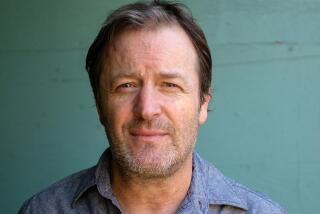BOOK REVIEW : Tale of 2 Horse Lovers Limps to a Finish : HANK & CHLOE by Jo-Ann Mapson ; HarperCollins $20; 320 pages
- Share via
The location is south of Los Angeles down by Irvine. The author of “Hank & Chloe” asks us to take another look at that beautiful land--once belonging to the Indians, then parceled out in Spanish land grants, then as ranch land belonging to Anglos “of good family,” and now evolving, unappetizingly and relentlessly, into white stucco warrens for modern men and women.
The brown earth now covered with white stucco condos and that big university.
But the shadow world still remains. Voices of Spanish settlers whisper across undeveloped land. A last rustic holdout won’t sell his parcel to developers; his cattle, chickens and goats move in still-unsold verdant meadows. A friendly stable, quite close to a junior college, rents ancient horses out for lessons.
Both the stable and the junior college appear to belong to a time that is passing. There isn’t room for the luxury of allowing kids to learn at their own pace. There isn’t time to learn to subjugate your all-fired ego to another creature, a lowly horse. Everything must be paved over, PDQ! Artificial boulders must be constructed in artificial gardens in front of those white stucco condos.
Untenured professors at the local junior college, teaching non-essential courses like mythology, are as obsolete as the grungy old cowpokes who still dot this very Southern California landscape, where if you squint your eyes and wish hard, you can still see the beautiful, recent past.
Hank teaches mythology at that downsizing junior college. He knows it’s fairly pointless, but he’s stuck in his daily life, missing out on love and fun, seeing his parents in their condo; seeing the future, seeing budget cuts, but powerless to do much about any of it.
As luck would have it, a friend is present at the college’s agricultural department when one of their last mares dies giving birth. The vet isn’t around, but Chloe, who gives lessons over at the stable, is there to help--drenched in blood, doing her best to save the mare in question, failing. But a foal, promise of a new life, does remain from this fateful night.
Chloe is a hard-luck woman, abandoned by her mother, raised in a children’s home, batted around from one foster home to another. She has been rescued (barely) by a boozy old coot named Fats Valentine, who discovered her early and trained her to ride.
Chloe lives now, with other renters, on a patch of wilderness that developers covet, in a primitive house built into the side of a mountain. She reads by oil lamps, pumps her water, works as a waitress at a ratty restaurant and spends hours at the stable, giving lessons to pay off debts that the dead Mr. Valentine has left. Her only loves are Hanna, her German shepherd, and Absolom, her beautiful--but ailing horse.
This novel could actually be shortened to a monograph. Both Hank and Chloe are starved for love. Hank has spent significant chunks of his childhood on his grandmother’s ranch in Arizona and rides beautifully. (He gives hints of this throughout the book.)
The plot thickeners that keep these lovers apart lump up like flour in a badly cooked stew. The police raid on Chloe’s house in the middle of the night--instigated by a developer who wants the property. A cop breaks her ankle in three places and whisks her off to jail, naked except for a horse blanket, in front of television cameras. I’ve watched a lot of television news, way too much television news, but I’ve yet to see a naked lady show up at 6 o’clock on any of the networks.
All kinds of technical novelistic questions keep coming up here. Why doesn’t Chloe refuse to pay Fats’ debts, since they were never married? Why must she work 16 hours a day to live in desperate, abject poverty, even though she’s 33 and has been working for years? Why doesn’t she give a TV interview after the police break her bones so that she can collect her settlement money almost instantaneously?
Why do she and a young friend come upon a beheaded cow that is never in any way explained? Why must Hanna, that feisty German shepherd, literally drive the mild-mannered professor into a tree for more than two hours? Why, when a mysterious telephone caller keeps ringing up the lovers every hour, don’t Hank and Chloe just get their number changed? The biggest question of all: Why didn’t an editor give some decent answers to these questions? Why leave it to the luckless reviewer to have to bring them up?
The great strength of this novel is the characters, and the endless, affectionate details about horses--their temperament and frail health--and all the ups and downs of riding. Stable life is lovingly portrayed here; that shadow culture of horse trainers and veterinarians and people who love animals as much or more than other people, offers a sweet and attractive alternative vision to what life is for most of us now--cars, freeways, jobs, lawns, traffic and half-realized yearnings for what used to be, here in this beautiful land we live in.
More to Read
Sign up for our Book Club newsletter
Get the latest news, events and more from the Los Angeles Times Book Club, and help us get L.A. reading and talking.
You may occasionally receive promotional content from the Los Angeles Times.








